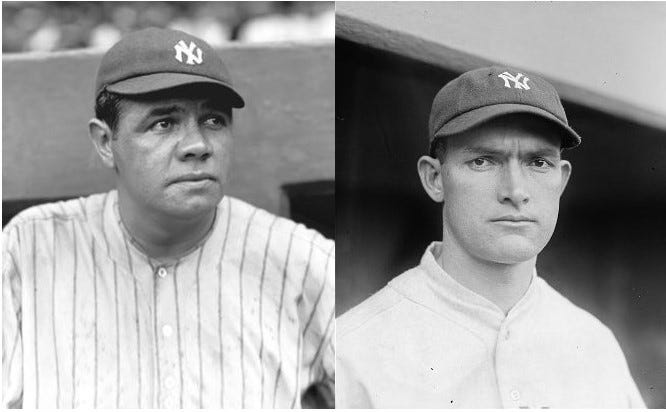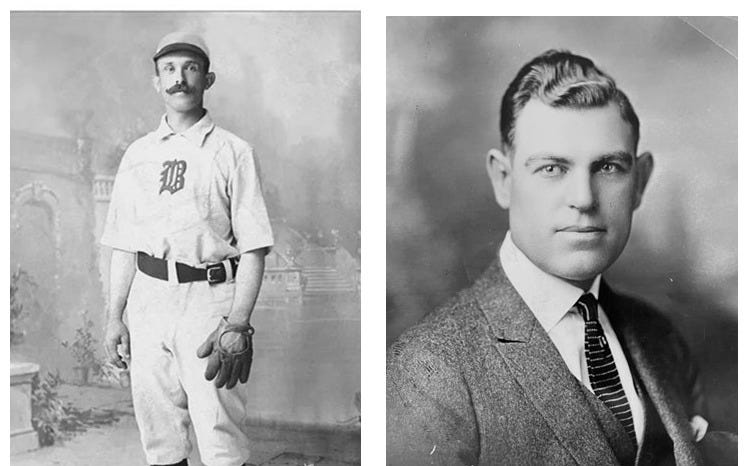Backroads and Ballplayers #98
Stories of the famous and not-so-famous men and women from a time when baseball was "Arkansas' Game." Backroads and Ballplayers Weekly is always free and short enough to finish in one cup of coffee.
The Lost Story of 1915: A New Beginning
In 1910, the Travelers abandoned East End Park, and pro baseball in Little Rock took an unscheduled leave of absence. Hugo Bezdek at the University of Arkansas, and Morley Jennings at Ouachita, made college baseball relevant during the time without minor-league baseball, but it took a cast of historic characters from very different backgrounds to restore pro baseball to Arkansas’ capital city.
As we begin the 2025 baseball season, this seems to be a good time to reflect on a pivotal year in Arkansas baseball history that occurred 110 years ago. Today the story of Judge W. M. Kavanaugh is the lead story in Only in Arkansas.
The men behind the 1915 Travelers:
A Judge - William Marmaduke Kavanaugh Only in Arkansas (please read and share)
A New Owner: After an undistinguished playing career, Robert Gilman Allen, became the owner and field manager for the 1915 Little Rock Travelers. He soon abandoned the manager part of his new adventure, but he would be the owner/general manager to rebuild the shaky franchise. As expected, the 1915 Little Rock Travelers finished last in the Southern Association and drew less than 90,000 fans.
Robert Allen's purchase of the Arkansas Travelers marked the beginning of an exciting new chapter for the team and its fans. With a focus on player development, community engagement, and solid business practices, Allen's leadership guided the Travelers toward a bright future. The impact of Allen's ownership would be felt for years to come, leaving a lasting legacy in the history of baseball in Arkansas.
A Pitcher: A 21-year-old college guy just a year out of the agricultural school in Russellville would pitch more than 300 innings for the 1915 Travs winning 16 games and losing 20.
William Allen “Bill” Fincher was born in Atlanta, Georgia, in 1894 and attended 2nd District Agricultural School. (Arkansas Tech) Fincher would be in the big leagues by the 1916 season. In 1916 he appeared in 12 games for the St. Louis Browns. Fincher pitched 21 innings with a 2.14 ERA and a record of 0-1, in his only major league season.
Fincher is credited with 213 minor-league appearances. Among his minor-league travels was a brief stop pitching for Paris, Arkansas, in the Western Arkansas League for the first few weeks of the 1924 season. Fincher died on May 5, 1946, of a self-inflicted gunshot wound.
A Yankee Star: As the dismal 1915 season entered its excruciating final weeks, Robert Allen needed a fill-in for his suspended shortstop. With a cellar finish virtually assured, rather than signing a pro player for a reasonable salary, Allen found an 18-year-old semipro named Aaron Lee Ward in the Southeast Arkansas League who could be lured to pro baseball at little expense.
Aaron would get in seven games, bat 18 times, and not get a single hit. When a shortage of players due to World War I military service, and a reputation as a “glove man” provided Ward with a major league promotion, the Arkansas Gazette recalled Ward’s stint with the Travs, “He put up a classy game at short, but he couldn’t hit at all.”
Surprisingly the young infielder from Booneville, Arkansas, did hit eventually major league pitching. Ward was a New York Yankee star in the first half of the 1920s decade. In most of Ward’s years in the Yanks’ lineup, he was second on the team in home runs to his teammate Babe Ruth. When the Yanks won their first World Series of the Babe Ruth era, Aaron Ward was instrumental in the series title. On the opening day of the new Yankee Stadium, Aaron Ward got the first hit by a Yankee in the new park. His prize was a box of cigars!
In the 1923 Fall Classic, the Yankees finally beat the rival Giants, four games to two. Ward hit .417 in the World Series, leading the team in most hits, and fielding a ground ball to second that ended the series and initiated a New York celebration that lasted for weeks.
A Point Man: When the Travelers baseball franchise was revived in 1915, new owner R. G. Allen began looking for a front office guy to act as a liaison to a city he knew little about. He found the right man for the job in a businessman named Raymond Winder. Allen needed a local well-respected point man and Ray Winder fit the bill. For the next few years, Winder the baseball executive, and Winder the businessman coexisted.
Winder managed various business-related tasks for the Travs, served as road secretary, and did public relations work. In addition to his newly acquired baseball positions, he was appointed clerk of the Little Rock Municipal Court. Always the entrepreneur, Winder later added a dance hall and dance lesson academy to his occupations. The “Place for Respectable Ladies and Gentlemen” charged $1 per couple for an entire evening or 10 cents a dance for more frugal customers. Ray Winder’s name was synonymous with Travelers baseball for the next 60 years.
Next week Year Two: Rube and Baby Doll start the climb to success.
____________
A Subscription sends the weekly post to your mailbox. There is no charge for the subscription or the Backroads and Ballplayers Weekly.
If you do not wish to subscribe, you will find the weekly posts on Monday evenings at Backroads and Ballplayers on Facebook. SAVE THE LINK…
____________________
More Arkansas baseball history and book ordering information: Link
Welcome new subscribers. Have you missed some posts? Link






